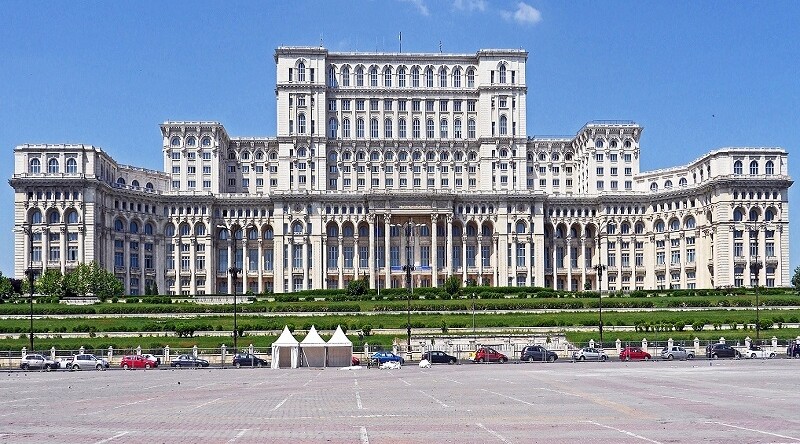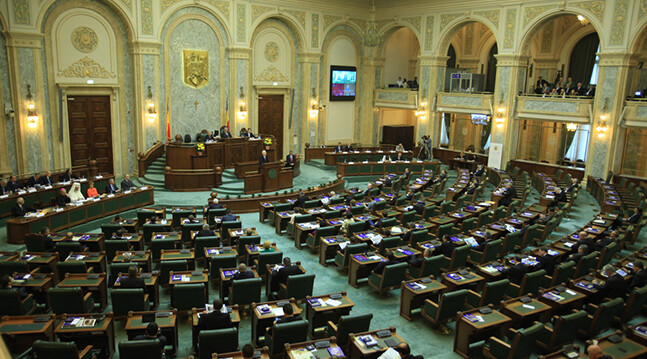The results of the May 26th European Parliament (EP) elections and justice referendum in Romania proved insightful on the positive impact that a diaspora's political remittances may have on the future of European liberalism and the project of furthering continental cohesion. On a continent gripped by anxiety and division, Romania's pro-European electorate stands apart having just delivered a humiliating blow to its ruling populist coalition. The country's critical tactical win against its own populists is a hopeful sign for its consolidation as a liberal democratic state but its polarized political culture and deep social instability remain long-term structural vulnerabilities as the country pursues a bigger role on the continent's political stage.
The demographics of a European destiny?
Romania is especially vulnerable to the global rise of isolationist tribalism, especially the European revival of right-wing extremism within Western democratic societies. Its current economic growth, even though impressive among EU member states, does little to upend the stark socioeconomic discrepancies that underpin an unparalleled level of emigration. Its diaspora, the source of widely distributed cash infusions that sustain local consumption, is highly vulnerable to fascist-like rhetoric in the host countries of the European Union.
A conservative estimate has one in five working-age Romanians now living abroad, with some 2.5 million of the 3.4 million Romanian diaspora residing in EU member states. The Ministry for Romanians Living Abroad estimates the diaspora to number 4.4 million but credible figures are hard to come by. These statistical discrepancies have to do with the restrictive definitions of documented emigrants. Somewhere between 12 percent and 17 percent of the country's total population is believed to have established residences abroad, but that doesn't account for the largely undocumented low-skilled seasonal workforce freely migrating on demand in Western EU member states. Among the country's urban, presumably more skilled population, close to 16 percent have permanently moved abroad and the age group of this mobile labor force also implies that more Romanian children are now born abroad than in the country. Children belonging to the unrecorded seasonal workforce are left in precarious social settings raised by extended informal support networks. The poorest region of the country, the Romanian Moldova region, has a GDP per capita at 36 percent of the EU average according to Eurostat and consequently almost 18 percent of its natives have established residence abroad. A UN report in 2015 estimated that between 2000 and 2015 the Romanian diaspora grew by 7.3 percent with 3 million Romanians having left the country in that period. Worldwide the Romanian diaspora's growth rate trailed only that of the Syrian diaspora and this was in a EU member state.
Gauging the realistic number of Romanians actually living abroad is politically fraught. Recognizing the true size of the diaspora would force the state to proportionally increase their representation in the country's legislature. It would also force a recognition of the historic magnitude of the demographic collapse induced by poor governance and force an honest public discussion about skilled human capital depletion, heightened political instability, and the collapse of trust in institutions of social cohesion. To encourage return migration or leverage its diaspora on the European stage, the state would have to accommodate the diverse needs and political values of this foreign-resident population and those values are not compatible with the entrenched political elite.
Who defeated the Romanian populists?
The dismal results of the ruling populists in the diaspora were predictable. The lack of support for the populists in the diaspora has been evident since the 2014 presidential elections and the Social Democratic Party (PSD) did little to hide its contempt for this population. From disparaging remarks about the country's diaspora, to launching policy proposals about restricting citizenship and residential taxation, to possibly backing European populists in restricting labor migration, the PSD has done everything it can to sever the country's ties to its labor force residing abroad. The showdown on justice reform resulted in diaspora organizations mounting multiple mass protests over the last years. The latest was a mass diaspora rally against the ruling populists in Bucharest in August 2018. Yet again the populist government sent in the riot police resulting in violence with hundreds of people beaten and hospitalized. The visceral rift between the populist government and the diaspora played into the EP elections with a vengeance.
In an exact repeat of the 2014 presidential elections, the Ministry of Foreign Affairs in Bucharest appears to have "mismanaged" the organization of polling stations abroad, once more strangely failing to secure sufficient logistical resources despite almost doubling the number of voting stations abroad. A huge number of Romanians living abroad were denied the right to cast their ballots and this after showing an impressive level of civic responsibility and patriotism, driving across host countries and standing in lines for hours, often with children, outside consulates and polling stations set up in the major cities across the European Union. One notable detail is that many of those Romanians residing abroad could have comfortably cast their ballots in EP voting stations for representation by their host country's politicians. The act of showing up at Romanian consulates was an act of civic responsibility towards Romania's interests and influence within the European Union. After hours of waiting, many remained outside the voting stations at closing time. Mass anger resulted in Romanian consulates calling on local police forces to protect the consulates against their own citizens. Presiding over the repeated electoral debacle both in 2014 and now was Romanian Foreign Affairs Minister Teodor Melescanu, a man whose apologies for mismanagement ring hollow, especially since he refused to tender his resignation. He likely hopes to oversee similar preparations abroad for the upcoming presidential elections scheduled at the end of the year. Prosecutors and opposition parties are now mounting legal pressure against the minister seeking to hold the populist government accountable for deliberately restricting and preventing the right to vote through logistical misallocation of resources abroad.
Discredited entrenched populists
With the young workforce largely absent abroad, a predominantly older demographic is left at home, exposed to local manipulation and fear about the future of the country. Holding a toxic parliamentary majority since 2016, Romania's ruling populist coalition is led from the shadows by figures mired in corruption, people hiding behind parliamentary immunity, and indicted local strongmen hoping to use the reins of power to impede, obstruct, and influence court decisions. The still-ruling populist coalition extensively defanged the judicial branch, pressured prosecuting institutions, and outlawed the country's information services from sharing their investigative capabilities with prosecutors through proper institutional protocols. Until last month, the ruling populist coalition attempted to use emergency executive ordinances and its parliamentary majority to weaken anti-graft legislation, undermine judicial independence, and follow a path similar to that of authoritarian-prone neighbors like Hungary and Poland. Many chancelleries of European Union member states and the United States publicly expressed dismay at the proposed justice reform measures but found little they could do to impede the agenda of the ruling Romanian populists. Paradoxically while Romania held the rotating Presidency of the Council of the European Union, it faced threats from the European Commission that if it went ahead with the justice "reforms" it would be served Article 7 infringement proceedings with stark financial consequences, proceedings similar to those intended against Poland and Hungary. The populists in the latter two countries have so far defied the European Commission's pressures, pegging their hopes on the envisioned rise of populists following the EP elections and presuming the resulting ineffectiveness of such threats.
The dilemma for Romania's pro-European liberal opposition was whether to just lament the perversion of democratic processes or to trust that the electorate is fed-up with the antics of corrupt strongmen. Romania's center-right President Klaus Iohannis stood his ground against the left-wing populist government and used the opportunity of the scheduled May 26th EP elections to force a referendum on anti-corruption asking the electorate if they agreed to limit the powers of the executive in politicizing and controlling the justice system. By 80.9 percent the electorate confirmed that they wished to ban the attempted amnesty and pardon for corruption offenses and by 81.1 percent backed the ban on the government's attempt to use emergency ordinances impacting the investigation of crimes, the implementation of punishments and the judiciary organization. The more important picture was painted by the results in the diaspora. Romanian citizens living abroad voted by 92 percent to back the president's position against the attempts of the ruling populist coalition.
The implementation of the validated referendum in amending Romania's constitution is likely to be protracted but the immediate impact was seismic. Within hours of the results of the referendum, the country's foremost political strongman Liviu Dragnea, the populist cabinet's puppet-master, head of the PSD, and president of the Chamber of Deputies, was sentenced and incarcerated. Convicted of electoral fraud in 2016 Dragnea could not have himself become the prime minister, but he succeeded in eschewing corruption investigations and incarceration surprisingly until the morning after these EP elections. The ruling party woke up to the need to reinvent itself and do so while it still holds the reins of power so, coincidence or not, the courts gave their verdict, and Dragnea was unceremoniously deposed. Flipping her stance, Prime Minister Dancila, took on the reigns of the PSD party and rapidly walked back her government's official position on the implementation of controversial justice laws. It remains to be seen how much purging the PSD is willing to implement or if financially powerful local "barons" are still able to hold onto power. Its greatest problem is not the lackluster international pressure against autocratic populists. Its real problem is that it mobilized the urban young mobile demographic against itself and humiliated the country's booming diaspora.
PSD's results in the EP elections were dismal for its size. With 22.5 percent, it came in second trailing the National Liberal Party (PNL), the opposition party formerly headed by current President Iohannis. PNL outperformed expectations at 27 percent and its 10 Euro parliamentarians will join the ranks of the center-right European People's Party (EPP) together with two parliamentarians from the People's Movement Party of former President Traian Basescu and two from the party of ethnic Hungarians in Romania (UDMR). PSD will likely align its eight seats with the European Socialists & Democrats who are to gain the two seats gathered by ProRomania, the splinter party of former PSD-appointed Prime Minister Victor Ponta, which is gradually absorbing disgruntled PSD centrists. The twist of fortunes could not have been starker for the junior partner of the ruling populist coalition, a Romanian Liberal Democrat "ALDE" party that was largely the personal political vehicle for Romania's Senate president and former prime minister Calin Popescu Tariceanu. His party barely garnered 4.28 percent, failing to meet the threshold for a single seat. He was the only party leader to openly boycott the referendum and is now negotiating to retain his parliamentary immunity in order not to face prosecutors in an anticorruption probe that would have him end up like his partner Dragnea.
Enfranchising the diaspora's mandate
The most encouraging performance was the result of the newly formed opposition 2020 Alliance, made up of the Save Romania Union (USR) and Party of Liberty, Unity and Solidarity (PLUS), a grouping defined by urban educated professionals and people that proved themselves adapt at building careers abroad but chose to invest themselves in the country. It actually come in third with 22.36 percent, but it might have come second if it were not for voting irregularities caused by administrative obstacles especially in the diaspora but also in major urban centers. Despite the best efforts by the ruling coalition to skew the results, after the final tally the difference between PSD and this new 2020 Alliance may be a margin of less than 0.1 percent, some 12,500 votes. The pro-reformist 2020 Alliance has as a senior partner with the USR, a new party that barely made into the Romanian Parliament in 2016. Former Romanian prime minister and former European agriculture commissioner Dacian Cioloș is the junior leader of this alliance on behalf of PLUS, a party that could barely register itself in March of this year and which might not have been on the ballot were it not for the opposition alliance. Together they successfully tapped into the widespread pro-reform, anti-establishment sentiment that resonates especially in major urban centers within the country, but also echoes the needs and concerns of the large diaspora. The electoral results in the Romanian diaspora look very different from the national results. In the diaspora the Alliance 2020 actually led with a 37.4 percent followed by PNL at 31.9 percent and the ruling PSD barely garnered a dismal 4.1 percent.
The Romanian 2020 Alliance is now to align its resulting seats with the newly rebranded "Renew Europe" parliamentary group made up of the European Liberals (ALDE), French President Emmanuel Macron's En Marche, and other parties. This third largest European Parliamentary group just elected Romania's Cioloș as their leader, turning a dark horse Romanian candidate who barely made it on the ballot lists into one of the most influential European leaders.
Absorbing political remittances
The EP elections have no direct impact on the Romanian legislature or executive. Legislative elections that could upend the status-quo are to be held only in late 2020. In the interim the discredited ruling populists have to police themselves for fear that electoral anger may only help galvanize a coherent opposition. The time may well be used towards a needed reset of the political elite, a time for parties to define what they stand for, the vision they seek to achieve, and not just who they stand against. The fact that a mobilized Romanian diaspora succeeded to put on the European stage a political figure that now is entrusted to rally European liberals and progressives is truly a coup for this largely disenfranchised mobile labor force.
The story of Romania staving off populists is at the core one of a humiliated but mobilized diaspora, millions of citizens living abroad in the EU, people who are gradually finding their voice being heard in national politics, mobilizing their kin at home, and possibly creating networks of influence within their host communities abroad. This diaspora stands a good chance at reshaping the parameters of Romanian national politics but also at inclusively reshaping the discourse of national belonging within the European community of common values.
What the Romanian diaspora teaches us is that transnational populations can be influential political actors effectively impacting the parameters of national politics. It also teaches us that diasporas are amorphous entities that often lack proportional institutionalized representation. When diasporas gain proportionate political representation, their enfranchisement may consolidate an inclusive liberal European project because their very existence depends on it.




